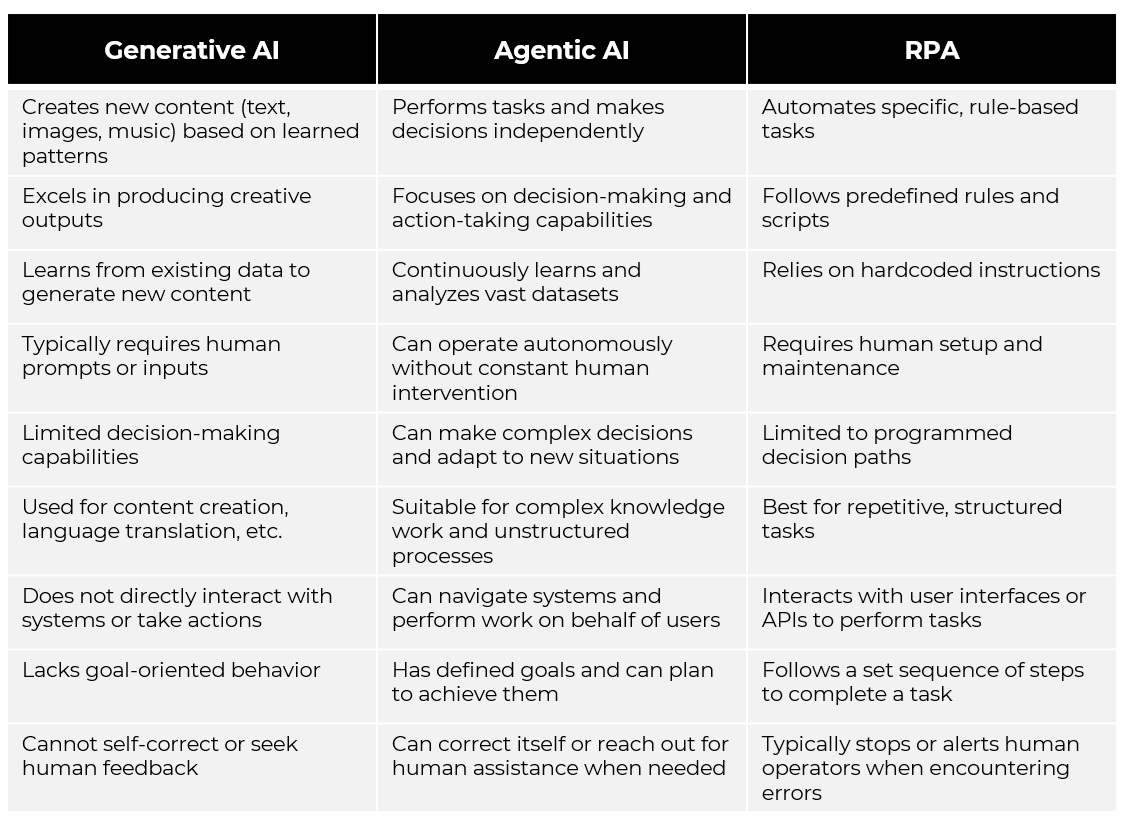Agentic AI vs Generative AI: What's the difference? - Servicely
The pace of Artificial Intelligence’s (AI) evolution is near light-speed. As an observer or casual AI user, it can be hard to keep up with the incredible rate of change as AI technology is developed and businesses rush to implement it.
Over the past couple of years, we’ve become familiar with Generative AI (GenAI), with the likes of ChatGPT, Perplexity, and Google Gemini used day-to-day by many. More recently, we’ve seen a new type of AI emerging - Agentic AI. With much of the hype around Agentic AI focused on how autonomous it is and the ability for the AI to specialize in certain tasks, let's take a look at the differences between Generative AI and Agentic AI.
Generative AI
Generative Artificial Intelligence (GenAI) is a type of AI that can create new content and ideas, including written word, audio, images, and video, as well as draw upon and reuse its known data to solve new problems. GenAI models can also learn new things, like languages, programming languages, and complex subject matter.

Think of Generative AI as “the creator”, with the core focus of GenAI being the creation of various forms of content. Some examples of this content creation are:
- Creating written content
- Generating audio and visual media
- Developing new ideas and solutions

Beyond the creation of new content, GenAI can also draw on its knowledge to carry out other tasks, including:
- Debugging code
- Researching and brainstorming
Generative AI is ideal for augmenting human creativity and reducing repetitive tasks, but it still requires human intervention to guide its outputs. It can produce remarkable results, but it lacks reasoning and autonomous action.
Agentic AI
Agentic AI, sometimes referred to as autonomous AI or AI agents, are AI systems that can act autonomously with intent, make decisions, and execute tasks to achieve specific goals, with minimal human intervention. Unlike generative AI, which focused on the creation of content, Agentic AI uses deep learning and real-time data processing to make decisions, plan actions, and execute them.
Agentic AI is not just an assistant – carrying out delegated tasks – it’s a decision-maker, capable of critically assessing data and context, automating workflows, and triggering actions based on real-world conditions, without the need for human oversight.
In contrast to GenAI being “the creator”, think of Agentic AI as “the doer”. Agentic AI is focused on completing tasks autonomously. Here are a few examples of what Agentic can do:
- Proactively identifying and resolving IT problems
- Automating complex workflows
- Handling end-to-end incident resolution for end-users

While these example use cases will provide a business with major productivity gains, it's worth noting that this is merely a taste of the power of Agentic AI. AI agents can be trained to do almost anything!
In short, Agentic AI and Generative AI each serve a distinct purpose and aren’t a “one or the other” choice. Both Agentic AI and Generative AI can deliver measurable transformational impact on a business’s productivity and operational efficiency.
When it comes to what AI models your business should use, the simple answer is… both. With their different capabilities and use-cases, using Agentic AI in combination with Generative AI will likely yield the best results.
There’s a lot of noise in the Agentic AI space right now, and it can be hard to know what is actionable and what is hype. Servicely’s enterprise service management platform is built with AI at the core – giving businesses the ability to leverage the power of AI to accelerate service across the enterprise.
We’re working alongside customers to implement Agentic AI agents into their service management processes, to proactively resolve issues, identify problems autonomously, and handle end-to-end incident resolution for end-users, all with low-to-no human interaction. If you’re interested in learning how you can implement Agentic AI into your service management – you can book a demo with our team here.










